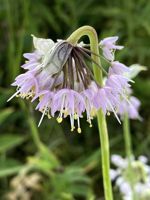Mon-Fri 9am - 5pm Mountain time
Tango Weigela vs Nodding Onion
Weigela florida Tango
Allium cernuum
CUSTOM GROW
NOT AVAILABLE THIS SEASON - MIGHT RETURN
Tango Weigela is one of the smallest weigelas. Its compact form makes it ideal for urban yards or areas with limited space. The red, funnel shaped flowers with yellow throats are eye catching and fragrant. Good for borders, hedges, and foundation plantings, you'll love this new addition to your yard.
Nodding Onion is a native perennial wildflower known for its nodding clusters of flowers that range in color from white to pink to purple. The lightly scented blooms provide pollen and nectar for pollinators, especially bees, which can collect while hanging upside down, a capability most other insects lack.
The narrow, grass-like leaves of the Nodding Onion can be used as a seasoning in cooked dishes, though bulbs and raw leaves should not be eaten in large quantities. All parts of the plant have an onion-like aroma when bruised, which helps deter deer and rabbits. They can self-seed readily, so removing spent blooms helps manage their spread. Tolerant of a range of soils, including alkaline, it is well-suited for a variety of plantings, including pollinator gardens and naturalization projects.
Tango Weigela Quick Facts
Nodding Onion Quick Facts
Toxicity: raw leaves and bulbs can be midly toxic

